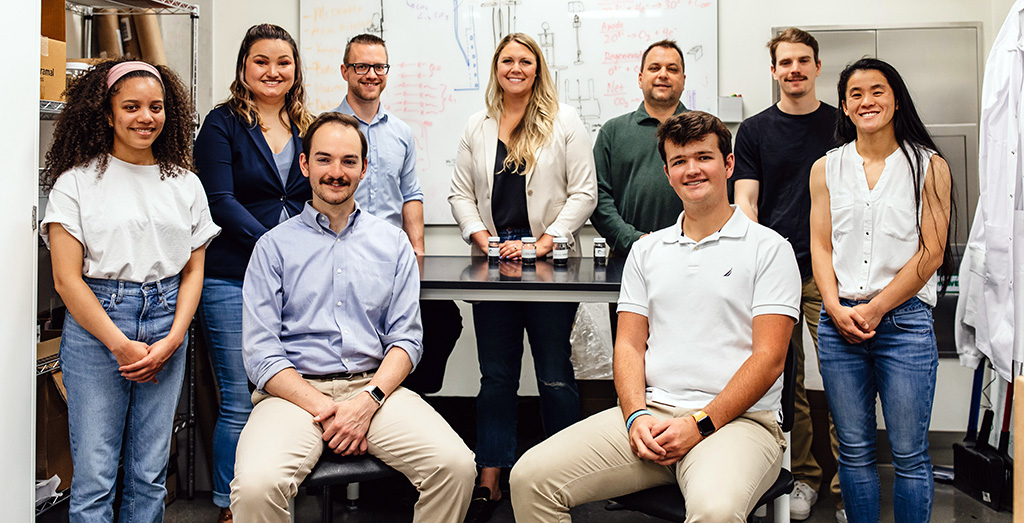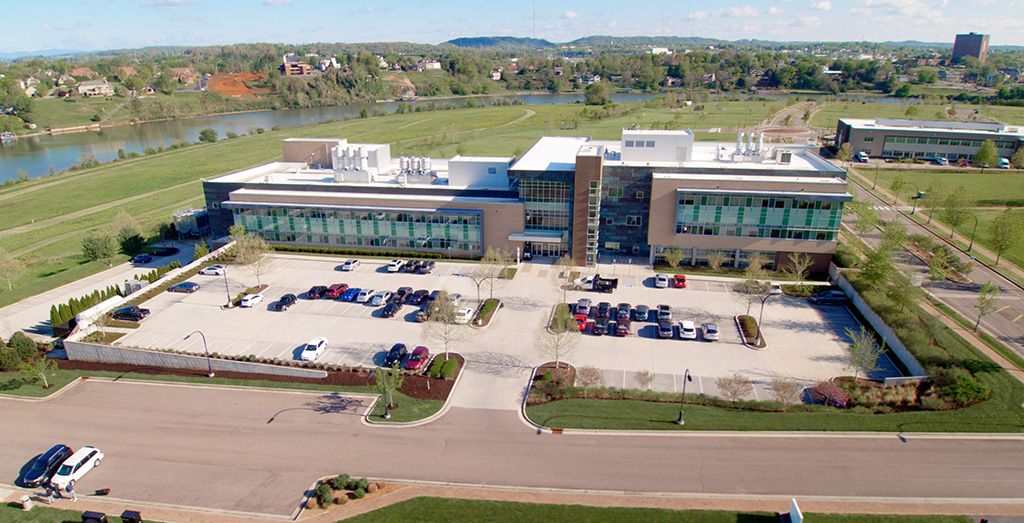According to 2021 numbers from the Bureau of Labor Statistics, 20% of startup businesses fail in the first year, 50% within five years, and 65% within 10 years.
The reasons for failure span myriad issues. For tech startups in particular, a misalignment between new technology and the market, or a lack of resources and funding, is often the main contributor.
Based in Knoxville, Tennessee, SkyNano Technologies is a tech startup that has beaten the odds, rising from an idea to successful implementation in just six years.
Founded in 2017, SkyNano developed a novel electrochemical manufacturing technology that captures and converts carbon dioxide into carbon-based materials and devices used daily by consumers. The new technology offers a way to achieve decarbonization, a process that reduces CO2 emissions and helps limit global warming.
Providing Immediate Solutions
Anna Douglas, founder of SkyNano, is originally from Ohio. Douglas first came to the Knoxville area to participate in Oak Ridge National Laboratory’s (ORNL) Innovation Crossroads, a two-year fellowship program focusing on energy and advanced manufacturing technologies. After completing the program she moved into the Spark Incubator Program, part of the University of Tennessee Research Park’s Spark Innovation Center. She grew her company substantially in the incubator and has now established her own commercial lab space in Knoxville, thanks in part to the support and networking provided by Spark.
“It had been clear to me since early in SkyNano’s journey that we would need physical laboratory space upon completion of Innovation Crossroads, and the Spark space was really set up well to provide an immediate solution to that need — so applying to the Spark Center was a no-brainer for us,” said Douglas.
In October 2020, SkyNano started a three-year project, funded with $2.5 million from the US Department of Energy, to demonstrate the capture of CO2 out of flue gas from natural gas power plants and storage of that CO2 in the form of solid carbon nanotubes.
To accomplish the basic goals of the project, the company needed access to sophisticated laboratory space with a fume hood, the ability to handle gas cylinders and access to a large amount of electrical power.
“The lab space at Spark was already equipped to handle the first two requirements, and they quickly installed a high-voltage circuit in the lab for us to be able to execute the tasks that required high-power requirements,” Douglas explained.
SkyNano has since secured over $10 million in grants and hired eight full-time employees. Douglas was recognized among the Forbes “30 Under 30 in Energy” in 2019, and in 2022 SkyNano received the Tennessee Governor’s Award for Environmental Stewardship in the Clean Air category.
Spark Stats
In the first two years of the center’s operation, Spark startup companies have achieved great things:
- $18 million obtained in grants (nondilutive)
- $15.6 million obtained in equity investments
- $1.2 million generated in recurring revenue
- 26 full-time employees hired
- 10 contract employees hired
- 10 internships supported
“The experience we had with Spark was that all the resources related to physical space and business mentorship we ever needed throughout our time in the business incubator were right there for us, and really enabled us to focus on what we do best: develop technology and execute our technical road map to accelerate the company towards commercialization,” said Douglas. “Without access to these resources, SkyNano would have spent far more time and energy finding substitutions, and likely would never have made such rapid technical progress.”

Anna Douglas, center, and the team at SkyNano Technologies
What Startups Need
Spark is focused on helping tech startups overcome several major challenges.
“The first is a frequent misalignment between tech development and market need,” explained Lilly Tench, director of the Spark Cleantech Accelerator. “Technical founders often learn too late that the vision of the scientist or engineer in the lab doesn’t match the needs of the customer in the real world. Spark helps mitigate this risk through early market research and exposure to customers during the Spark Cleantech Accelerator.”
A second major issue faced by tech startups, according to Tench, is the long runway often required to take an advanced tech product, especially a hardware product, from the lab to the market.
“Because many years of development is required to get a technical product ready for customers, many startups run out of resources and money before they reach that point,” said Tench. “Also there is often a gap in funding and resources between grant funding provided for research and venture funding provided to startups. The resources of the Spark Innovation Center help startups bridge this gap, with the goal of helping secure funding and get their product ready for commercialization.”
—Anna Douglas
Beyond the standard support of lab space and expertise to develop prototypes, Spark offers graduating companies a crucial next step — the incentive to build and grow in East Tennessee and a pathway to make it happen.
East Tennessee’s Tech Focus
The Knoxville-Oak Ridge area is one of the only locations in the US to have a cluster of three energy-focused business accelerators for tech start-ups: the Spark Innovation Center at UT, Innovation Crossroads at ORNL, and the Techstars Industries of the Future Accelerator, backed by the largest venture capital fund in the nation for early-stage tech companies and jointly supported by UT, ORNL, and the Tennessee Valley Authority. The strategic alignment of those resources within the larger innovation ecosystem in East Tennessee fills gaps and connects key resources in the region for tech startups.
In a recent article, UT Knoxville Chancellor Donde Plowman describes the manifold ways in which the university is focusing on innovation platforms, flexing its institutional strengths and creating economic opportunities for the state of Tennessee.
While any incorporated US business can apply to the Spark Cleantech Accelerator, eligibility requirements specify that applicants be open to choosing Tennessee as a permanent business location. According to Douglas, new businesses should not hesitate to consider moving to the region.
“Knoxville is the best place in the country to build and scale a hardware-based technology company,” she explained. “The region is recruiting at least 20 hard-tech startups here every year through Innovation Crossroads, Spark, and Techstars, and we think this trend will only continue to grow. The impact on the local economy is already impressive, and as more and more of these hard-tech companies find their permanent place in Knoxville, I’m excited to see just how impactful their presence will be. I wouldn’t be surprised if Knoxville is known as the new Silicon Valley in 10 years.”
Many tech startups have already discovered the benefits of locating to the region. Knoxville was recently rated the 16th top clean tech hub in the country by Saoradh Enterprise Partner.
For Douglas, the advantages are obvious: “Access to resources at ORNL through programs like Innovation Crossroads and also user programs like the Center for Nanophase Materials Science, access to talent at UT and access to the county’s largest public utility, TVA.
“The community surrounding tech innovation here is strong and rapidly growing. Our landlord is a great example of this — he is a commercial real estate agent who’s super excited about technology startups and innovation in the region and has been incredibly supportive of SkyNano’s needs as we’ve built out a laboratory space in a building that really wasn’t designed to be a laboratory space.”
Douglas said it has been easy to recruit top talent from the coasts.
“When they come to visit they realize how livable, affordable, and fun Knoxville can be,” she said. “We’ve also been able to collaborate with professors at the University of Tennessee and other regional startups in unexpected ways that are rapidly progressing our technology. One example of this is an ongoing collaboration with Professor Uday Vaidya, who we have a joint project with along with Endeavor Composites, another Knoxville startup, on developing carbon-negative building materials.”
Other Programs Fostered at Spark
Eonix has designed a nonflammable lithium-ion battery electrolyte and is on track to engage in grid storage and military lithium-ion battery pilots in 2023. Founder Don Derosa is originally from New York and came to the Spark Innovation Center to grow his company and further develop his technology after participating in Innovation Crossroads at Oak Ridge National Laboratory. Eonix has been awarded $4.1 million in research and development contracts and has entered a three-year collaboration with a public company valued at $15 million. Derosa recently grew out of his space at the Spark Incubator and has established a lab in the University of Tennessee’s Zeanah Engineering Complex, where he will collaborate with Tom Zawodzinski, UT-ORNL Governor’s Chair for Electrical Energy Conversion and Storage.
Green Llama is a sustainable cleaning products company founded in Johnson City, Tennessee, in 2020, with the goal of eliminating plastic waste and toxins in cleaning products. Green Llama offers all-purpose cleaners, bathroom cleaners, and glass surface cleaners. Co-founders Kay Baker and Matt Keasey participated in the Spark Cleantech Accelerator. Green Llama can now be found in more than 35 stores across 18 states and Puerto Rico.
Windfall, along with partner company Carbon Rivers, has developed a system to recycle and recover high-purity fiberglass from wind blades and automotive composite scrap. The company, founded by UT Research Assistant Professor Ryan Ginder, participated in the Spark Cleantech Accelerator. Windfall is set to develop the first full-scale US-based glass fiber recycling facility, located in East Tennessee.
